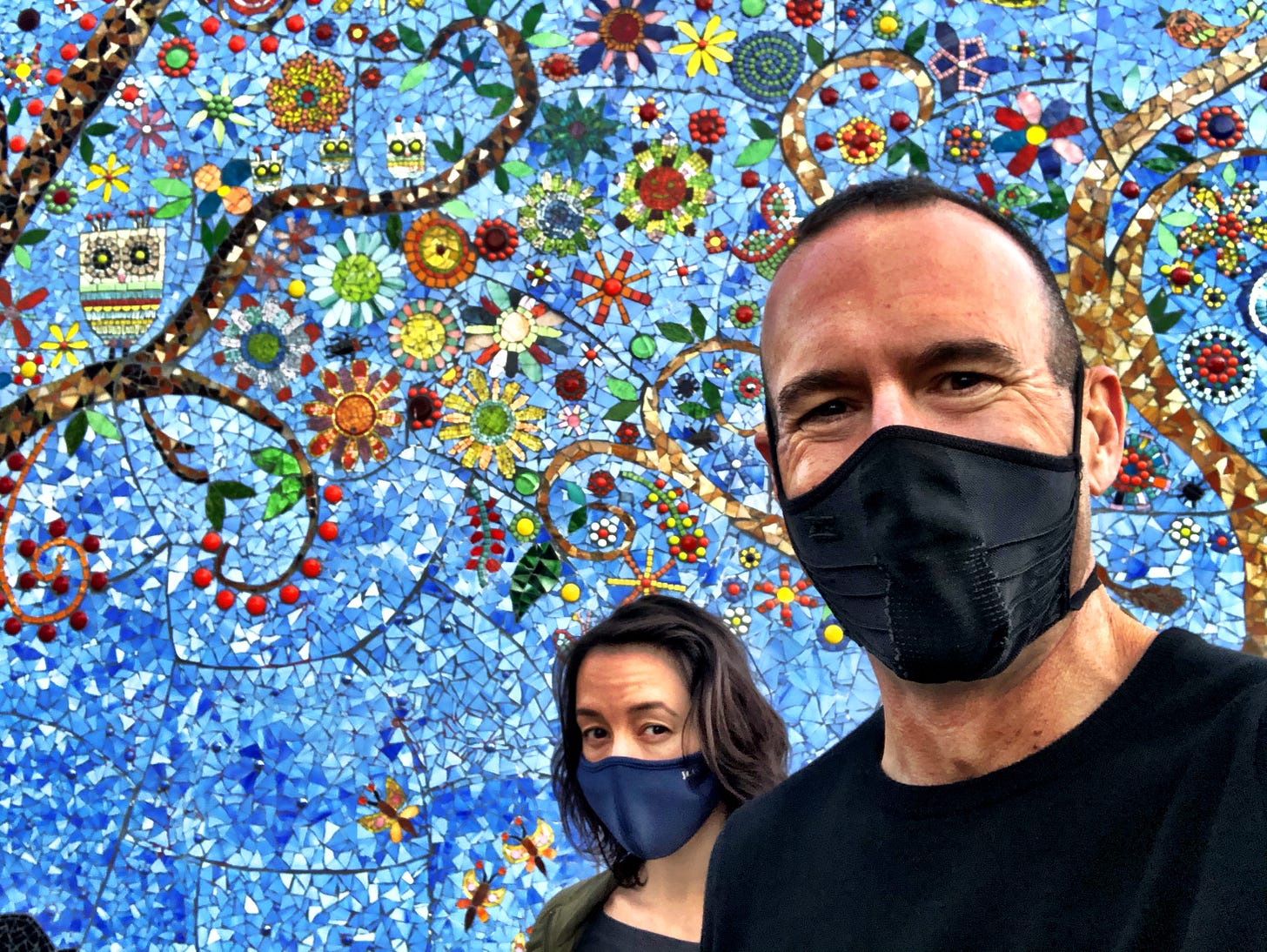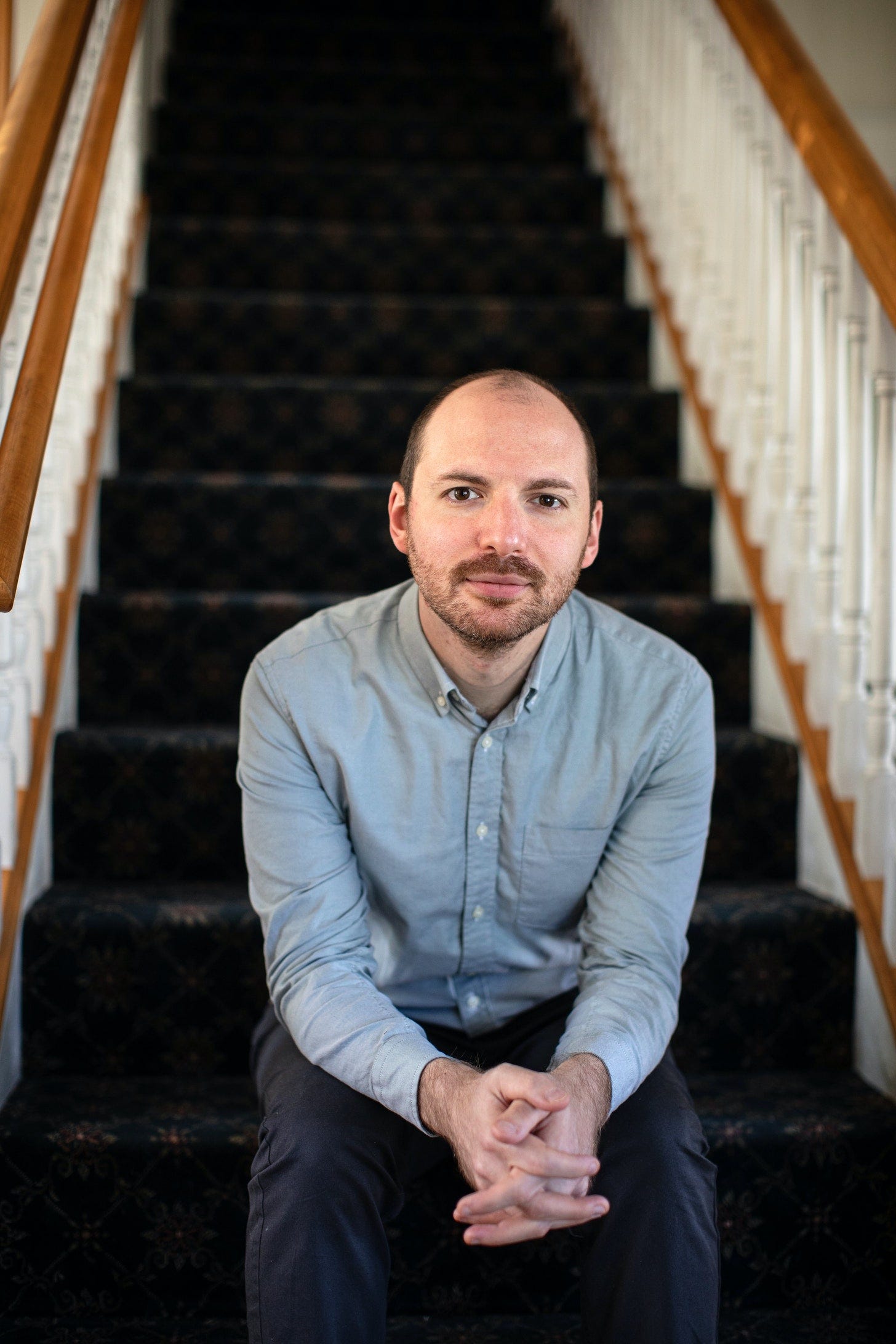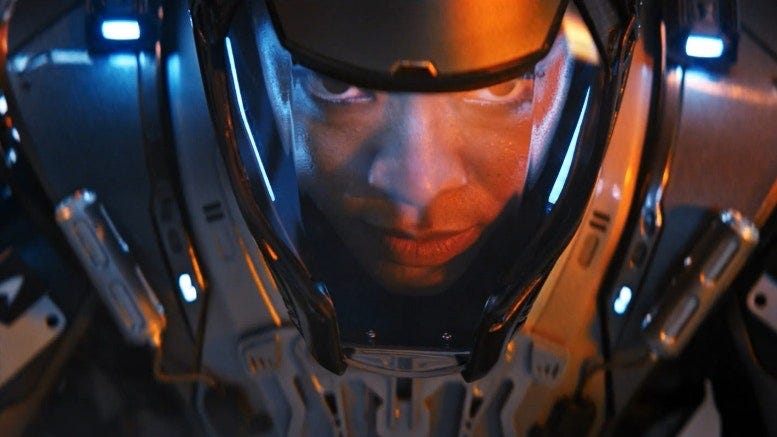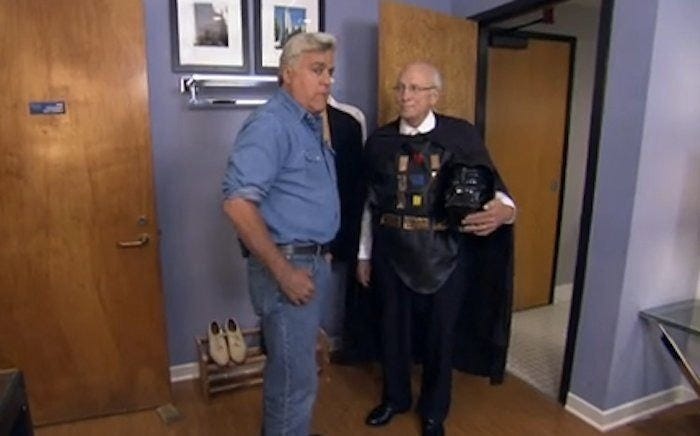Welcome to The Experiment, where we’re charmed, I think, by the rallying cry of Spanish fascists: “Viva la muerte!”
This week we start with something special, an excerpt from a new book by my friend Maurice Chammah’s “Let the Lord Sort Them: The Rise and Fall of the Death Penalty.” Then we’ve got Lt. Col. Matt Butler, who compares Star Trek: Discovery to modern warfare in a thrilling essay called “See first. Decide first. Act first.” And finally we’ve got Jack Hughes unpacking the similarities between Dick Cheney and Darth Vader in, heh, “Siths of the Father.”
And as always we remember who we’ve lost and offer recommendations on what to do (spatchcock chicken), read (a new poem from my friend Roger Reeves), watch (Tom Hanks’ News of the World), and listen to (lots of good new songs on our Spotify playlist).
But first, let me tell you about the strangest text I got this week.
Even for Austin, this was weird.
“I’m so sorry for the late notification,” texted my friend Josh, “but we can put another thing on the moon.”
Let me back up. In 2019, SpaceX launched a Falcon rocket that was carrying a moon lander from commercial space exploration outfit SpaceIL. On board the moon lander was a Lunar Library from the Arch Mission Foundation, which wants to preserve all human knowledge in space where, one supposes, the lack of oxygen prevents book burnings and such. The 2019 payload contained a full copy of the English language Wikipedia, 25,000 books and other resources, including collections from Project Gutenberg and the Internet Archive, and the Long Now Foundation Rosetta and PanLex datasets, which provide a linguistic key to 5,000 languages with 1.5 billion cross-language translations.
Also, it contained the never-before-published Kerbey Queso recipe from Kerbey Lane Cafe because, well, it was funny.
“We choose to send queso to the Moon – and maybe someday chips as well, not because these things are easy, but because they are hard,” wrote Mayor Adler in an accompanying note. “The challenge to eat queso in zero gravity is one that we are willing to accept, one we are unwilling to postpone, and one we intend to win, among other key challenges, like next time remembering the chips.”
Now, two years later, SpaceX is sending up another rocket, and Josh wanted to know if anyone had an idea about what to send to the moon this time, and the deadline was — well, it’s this weekend. If you had a couple hours to send a message from Austin to the moon, what would you say? The deadline was Sunday, tomorrow.
I raised my hand.
***
Hello from Austin,
If you’re reading this, that means you’re on the moon which means our planet, Earth, is still here, or in your case, there. This is good news and frankly comes as no small surprise, because from when I’m writing this we’re not sure if we’re going to make it.
How do I explain what this moment is for us here? Two years ago, we sent a recipe for a hot cheese dip up there because we thought it was funny. Now we’re all just hoping to live long enough to get vaccinated because a virus has killed 2.2 million of us, and even if the virus doesn’t kill us we’re worried about being shot for no reason by angry people, which happens here. And even if we don’t die before our time — life expectancy is actually falling here now — we’re worried about falling into poverty and living on the street where people will consider our suffering a blight. I guess what I’m trying to say is that we’ve never felt more fragile.
A recipe for hot cheese dip just doesn’t seem appropriate.
Mostly we want to know, up there, when you’re reading this, are we still down here? Did enough of us get the vaccines in time? Did we start listening to the scientists and doctors? Did we figure out how to live together in peace?
A friend of mine observed the other day that if this pandemic were happening in the ‘90s there would be riots in Blockbusters.
Trust me, in 2021, that’s funny.
We can’t breathe the same air without running the risk of killing each other, so we’re migrating into a digital existence. When the virus came, humanity retreated. Anyone with a desk job grabbed a laptop and set up shop at their dining room table. It was like Dunkirk, but for the white collar economy. All those people are doing great.
But you can’t restock grocery shelves or deliver pizza from your spare bedroom, so a lot of people either lost their jobs or had to keep working around other people where they got sick. Also, people who were shut in among big groups of people, like in old folks homes or in prisons, got sick. Those people aren’t doing so great.
The people who got to work inside their homes rewired how we interacted. We got good at talking to each other through screens. We replatformed society from the analogue to the digital world. At first we only noticed how hard it was. We felt the pain of not touching each other or laughing in the same classrooms. We focused on our corporeal existence — hugging… a lot of us missed hugging — and failed to notice how well-suited humanity was to encoding life.
There’s this thing we call the internet, but that is just a word we gave to a digital existence. People say IRL — in real life — and online, as if they are different. But when our “real” lives were shut down, this great digital migration showed us how much of our real lives happens online. We’re still adjusting. Talking to someone through a screen feels less real than talking to their voice with a device called a telephone.
We still call them phones, but I watch videos, shop for clothes, send text messages, listen to music, record my exercises and changes in weight, and even wake myself up with this device. All of those digital interactions fall into this nebulous realm in our heads we call the internet, but that’s just a way we have of organizing data both as an intellectual and as a coding construct so I can buy shirts for 70% off.
In 2020, every person created 1.7 MB of data every second. That data is filling out pictures of ourselves in the digital realm. The digital me comes into clearer focus every time I get lab results, check Twitter, and pay my insurance bill. The online version of me gets filled out when my offline self goes online to pay my offline rent. My relationships come into clearer focus with every text, chat, and email.
My friend Barbary has a way to explain this, because this is all new to me.
“You need to understand that there is no such thing as ‘in real life’ anymore. There is now IRL offline and IRL online. It’s all real life,” she said. “And when you hold your phone in your hand, you are holding hands with yourself.”
Is Barbary from the future?
At the core of the smallest parts of our bodies are coiled strands of code — DNA and RNA. I read somewhere that our RNA first existed on Mars before it showed up on Earth, which is the name some of us gave to the blue marble that you can see from where you are. Maybe a meteor hit Mars and splashed some space gunk that plopped onto our planet, creating life. Funny thing is that RNA is the trick scientists used to create the vaccine against the virus that’s killing us. The same code that created us is the code that’s saving our lives. We’re a lab experiment that keeps going awry.
That reminds me of the time when my oldest son, then seven years old, was misbehaving. I told him that I brought him into this world and could take him out. That’s the kind of thing that used to be funny here.
“You didn’t make me,” he said. “You contributed…” And here he paused, choosing his words carefully. “…data.”
Seven years is long enough for every cell in our bodies to recycle into new ones. My data contributed to his creation, and his data powered his recreation, constantly upgrading himself until his code degrades and his body breaks down.
Is he still alive when you are?
A little while ago, a writer had this idea that technology is like a life form because it evolves. But if we created technology, then we created the internet. And if the internet is just a word for the digital beachhead that humanity is colonizing, then couldn’t we consider technology an expression of humanity? Of course technology evolves. Humans are basically fleshy bags of data limited by an average of two arms, two legs, one butt and one head. On a good day you can tell which is which. But with technology, we can expand our existence beyond our physical limitations. Technology isn’t evolving; technology is a tool for our own evolution.
I suppose we should be forgiven for being confused about all this. It’s like what this French poet wrote: “The form of a city changes faster, alas, than a mortal’s heart.” It’s fashionable to call this hastened, upsetting change “disruption.” Perhaps, though, we’re being gentrified, except not from a neighborhood but a planet.
Are you even human, or are you an artificial intelligence? We’re teaching machines to refill prescriptions and to write high-school football news stories. Maybe when you exist machines have become a new life form, and you’re up there on the moon and discovering that there used to be a life form called humans. We’re just discovering that we can teach machines to think.
Did you know that the first time someone invented this certain kind of machine to interact with humans — we call it a chatbot — it was named Eliza after Eliza Doolittle, a character in a play about a professor who teaches a young woman how to… oh, it’s a long story. This was back in 1966, three years before a human first stepped foot on the moon where you are now. The scientist, a man named Joseph Weizenbaum, created Eliza to see if he could create a machine that could respond to humans, but he didn’t count on how humans would respond to the machine. People started forming emotional bonds with Eliza.
Weizenbaum was most troubled when his secretary, who had watched him build the program from scratch over many months, insisted that he leave the room so she could talk to Eliza in private.
Eliza passed what we call the Turing test, named after Alan Turing, the inventor of this category of machines that we call computers. His test was whether someone could converse with a computer and not know that it wasn’t a human. But at this point, what’s the difference?
When you are, have humans passed the Turing test yet?
There’s a company nowadays that has filed a patent to build a new machine to extend our digital lives beyond our physical ones.
The patent, titled "Creating a conversational chatbot of a specific person," details a system that would access images, voice data, social media posts, electronic messages and the like to "create or modify a special index in the theme of the specific person's personality." In some cases, images and video could be used to create a 3D model of the person for extra realism.
It’s like Barbary said; it’s all real life, and we’re holding hands with our digital selves when we’re grasping our phones. But what happens when we die? Do we stop holding hands, and our digital self continues on?
If so, look me up, because I have some questions.
Actually, I have one question.
I want to know if we made it.
In 2020, even as bad as everything got — and seriously, even if you’re a genetically modified superhuman who was awoken from suspended animation in 2267, you’re going to want to Google that year in stealth mode — we believed we had a better future. We voted in record numbers, believing that electing better leaders would lead to better outcomes. We made a $7.1-billion, 20-year investment in the future of our city because we believed that we would survive so we might as well thrive. We marched for justice and equality, believing that our best selves could overcome our worst impulses.
Was that all for naught? Did we survive the pandemic only to inherit an ungovernable future? Did we find a way to end our cold civil war without it breaking wide open? Did we do enough, quickly enough, to keep this planet habitable for people to survive? Did we eventually learn that the lines of the map were imaginary, and that race was, too? Or were we only able to upload enough of humanity to survive digitally?
Did we learn to be human?
I guess I had more than one question.
Before you come down here, make sure things are OK. If the sky and the oceans are blue, that’s a good sign. If the air is brown, that’s bad. If you look closer and you see that we have covered our faces with masks, that’s a good sign, but it still means you should stay away. On the other hand, if you can see our smiles, and we’re standing close together in large crowds, and we’re dancing to music, and you can smell smoked meat and spilled beer, then you’re in the right place, and we are, too. So come for a visit. We’ll make sure to put you on the guest list under Marvin.
Yours in Austin,
Jason
The Experiment is free. If you’d like to support our work, you can buy merch for 35% off, toss something into the tip jar, and pre-order my book. Or you can share this on your networks, which I dig.
‘Let the Lord Sort Them'
by Maurice Chammah
I wonder about my friend Maurice Chammah. If I describe him as mild, do not mistake his gentle mien and calm visage as weakness. By his own free choice, he has chosen a vocation where he stares injustice in the face, writes down what he sees, and shows it to us. I could not bear the life Maurice has taken on for himself that he has turned of late into a book called “Let the Lord Sort Them: The Rise and Fall of the Death Penalty.” Maurice, a mensch if there ever was one and perhaps aware of my preference for good news, has graciously offered this excerpt for The Experiment, for which we offer gratitude for this brief period of good news in a long, awful story.
See first. Decide first. Act first.
by Matthew G. Butler, Lt Col, USAF
You thought you were done, right? Sonia Van Meter did her recaps of Star Trek: Discovery and that was the end of it, you thought. YOU THOUGHT WRONG. Here’s a real life Air Force Lieutenant Colonel to compare the finale of season two of Star Trek: Discovery to JADC2, or the Joint All-Domain Command and Control. Writes Lt. Col. Matt Butler, “A 21st Century battlefield commander’s abilities to manipulate conflict will soon approximate those of a 23rd Century Starfleet captain.” I know, right?
Siths of the Father
by Jack Hughes
Dick Cheney embraced comparisons between him and Darth Vader, but our pop culture maven Jack Hughes says the way the former Vice President and his daughter dispatched Donald Trump subverted the paradigm deliciously in a way that put the onus on us to accept new friends or beat dead horses.
Who we’ve lost
This rancher
How we’re getting through this
Making Moroccan chickpea soup
Not just saying hello on a chat (h/t Brendan Hodgson)
Changing when I share this newsletter on social media
Making creamy chickpea pasta with spinach and rosemary
What I’m reading
Maurice Chammah: “‘Let the Lord Sort Them: The Rise and Fall of the Death Penalty’” - Here’s the excerpt that ran in The New York Times.
When Danalynn Recer tells the story of her life—or at least of her career, though she seldom makes much of a distinction—she begins with a phone call. At the time, she was an extremely busy twentysomething, working on both a law degree and a master’s in history at the University of Texas at Austin. Some lawyers called the history department and invited her to an office with an oddly vague name: the Texas Resource Center. They represented men on death row, and the name served to camouflage such unpopular work.
Fast Company: “Architecture criticism matters more than ever, according to a critic bullied by Trump” - One blessing of the Trump era is that it gave me a newfound appreciation for architecture criticism
Architecture is the inescapable art, the art that does more than any art to shape how we live. But people don’t consume it in the same way they do a meal or a ticket to a rock concert.
Anthony Ha: “Walking Duck is a digital news startup trying to find middle ground in US politics” - This week, in f**k that guy…
Halperin said, “I recognize the expectations that people have. I’ve just continued to do my best to be a good colleague and a good professional. If people are willing to let me work, I appreciate the opportunities. But it’s up to them.”
Austin Kleon: “A good time to be a pack rat” - Creativity is all about making connections, which is harder in a clean room.
I realize that nowhere does Kondo explicitly say this, but there is a kind of anti-collecting streak in the book. Most artists are collectors, if not hoarders, and we don’t just collect the things that “spark joy”: we collect things (objects yes, but also hunches and ideas) that we’re unsure or ambivalent about. Things we get the feeling we could use later.
Casey Newton: “SPEAK, MEMORY: When her best friend died, she rebuilt him using artificial intelligence” - Yes, we all know about the Black Mirror episode
An uncomfortable truth suggested by the Roman bot is that many of our flesh-and-blood relationships now exist primarily as exchanges of text, which are becoming increasingly easy to mimic.
Charles P. Pierce: “The New York Times Has Tied Itself Into Knots With This One” - I’m so glad this kind of thing is Charles’ job.
You can read newspapers for 50 years and not see a newspaper tie itself in knots the way the Times does in this editorial.
Roger Reeves: “Future, from Beyond the Voice of God” - Roger makes me wonder if I have a favorite poet and whether it’s him, my friend Maggie, or my cousin Ellie, and how it came to such a pass.
I’m so in time I’m outta time—so selfie
I’m healthy—I mean I’m sayin though
You know what I’m sayin—
What I’m watching
I am not the only one to see a little of True Grit in News of the World. Brian Tallerico of rogerebert.com even called it a “dad movie” /shudders/. Nevertheless, it’s a generally well-reviewed if heralded Tom Hanks movie — people, it’s Tom Hanks. There are worse ways to spend $19.99 and an evening on the couch than to see News of the World. Like sincerity and good manners, this movie is so conventional it’s almost punk.
What I’m listening to
So. Much. Good. Music. This. Week. And as always, all the songs below have been added to our Spotify playlist.
Rediscovered Grace Jones’ version of Roxy Music’s “Love is the Drug.” Pure ‘80s confection.
Weezer’s got a new pandemic album, OK Human. I like “Screens” as a cultural artifact.
Michelle Obama likes Arlo Parks, whose debut album, Collapsed in Sunbeams, downshifts into a groove that can sustain you through a quiet evening. I’m just digging in. Start here, with “Caroline.”
Celeste is going to be a huge star, especially among those who drum their fingers in frustrated anticipation of Adele’s next album. If this is you, go check out Not Your Muse. Listen to this album now on repeat before it becomes so famous that you become sick of it. This is Nora Jones when she was just a new singer on the Blue Note label. This is Adele when 17 was a demo. Get in on this now while you can still enjoy it on your own terms.
Janet Yellin has Alexander Hamilton’s old job at Treasury, which prompted Joe Biden to joke that she should get her own musical now. Dessa didn’t quite oblige with a full musical but recorded a song in the style of Hamilton nonetheless called “Who’s Yellin Now?”
She knows the kinda stimulus it takes to pass a buck I heard she called the housing crisis She’s qualified as ffff — It only took a couple centuries The first female secretary of the treasury


What do you think of today's email? I'd love to hear your thoughts, questions and feedback. I might even put ‘em in the newsletter if I don’t steal it outright.
Enjoying this newsletter? Forward to a friend! They can sign up here. Unless of course you were forwarded this email, in which case you should…
If your new year’s resolution was to lose weight, try Noom, and you’ll quickly learn how to change your behavior and relationship with food. This app has changed my life. Click on the blue box to get 20% off. Seriously, this works.
Headspace is a meditation app. I’ve used it for a couple years and am absolutely shocked at how much it’s taught me about managing my inner life. Try it free for a couple weeks. Don’t worry if you’ve never done it before. They talk you through it.
I now offer personal career coaching sessions through Need Hop.
We set up a merch table in the back where you can get T-shirts, coffee mugs, and even tote bags now. Show the world that you’re part of The Experiment.
We’ve also got a tip jar, and I promise to waste every cent you give me on having fun, because writing this newsletter for you is some of the most fun I’ve had.
Forget the Alamo: The Rise and Fall of the American Myth by Bryan Burrough, Chris Tomlinson, and myself comes out June 8 from Penguin Random House. There is no better way to support this book than to pre-order a copy. You’re going to love reading what really happened at the Alamo, why the heroic myth was created, and the real story behind the headlines about how we’re all still fighting about it today.








